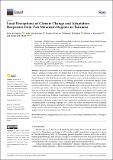Local perceptions of climate change and adaptation responses from two mountain regions in Tanzania
Abstract
Mountain environments and communities are disproportionately impacted by climate change. Changes in temperature are greater than at lower elevations, which affect the height of the cloud base and local rainfall patterns. While our knowledge of the biophysical nature of climate change in East Africa has increased in the past few years, research on Indigenous farmers’ perceptions and adaptation responses is still lacking, particularly in mountains regions. Semi-structured interviews were administered to 300 farmers on Mount Kilimanjaro (n = 150) and the Udzungwa Mountains (n = 150) in Tanzania across gender and wealth groups. Respondents in both mountains reported not only changes in rainfall and temperature, corresponding with meteorological data, but also a greater incidence of fog, wind, frost, and hailstorms—with impacts on decreased crop yields and increased outbreaks of pests. The most common adaptation strategies used were improved crop varieties and inputs. Wealthier households diversified into horticulture or animal rearing, while poorer households of Hehe ethnicity diversified to labour and selling firewood. Despite being climate change literate and having access to radios, most respondents used Indigenous knowledge to decide on planting dates. Our findings highlight how context and culture are important when designing adaptation options and argue for greater involvement of local stakeholders in adaptation planning using a science-with-society approach. Place-based results offer generalisable insights that have application for other mountains in the Global South.
Citation
Kaganzi , K , Cuni-Sanchez , A , Mcharazo , F , Marchant , R & Thorn , J 2021 , ' Local perceptions of climate change and adaptation responses from two mountain regions in Tanzania ' , Land , vol. 10 , no. 999 , 999 . https://doi.org/10.3390/land10100999
Publication
Land
Status
Peer reviewed
ISSN
2073-445XType
Journal article
Description
Authors acknowledge funding from the UK Research and Innovation’s Global Challenges Research Fund (UKRI GCRF) through the Development Corridors Partnership project (project number: ES/P011500/1). This work was also supported through the African Women in Climate Change Science Fellowship of the African Institute of Mathematical Sciences and the Next Einstein Forum, and the Climate Research for Development (CR4D) Postdoctoral Fellowship CR4D-19-21 implemented by the African Academy of Sciences (AAS) in partnership with the United Kingdom’s Department for International Development (DfID) Weather and Climate Information Services for Africa (WISER) programme and the African Climate Policy Center (ACPC) of the United Nations Economic Commission for Africa (UNECA).Collections
Items in the St Andrews Research Repository are protected by copyright, with all rights reserved, unless otherwise indicated.

